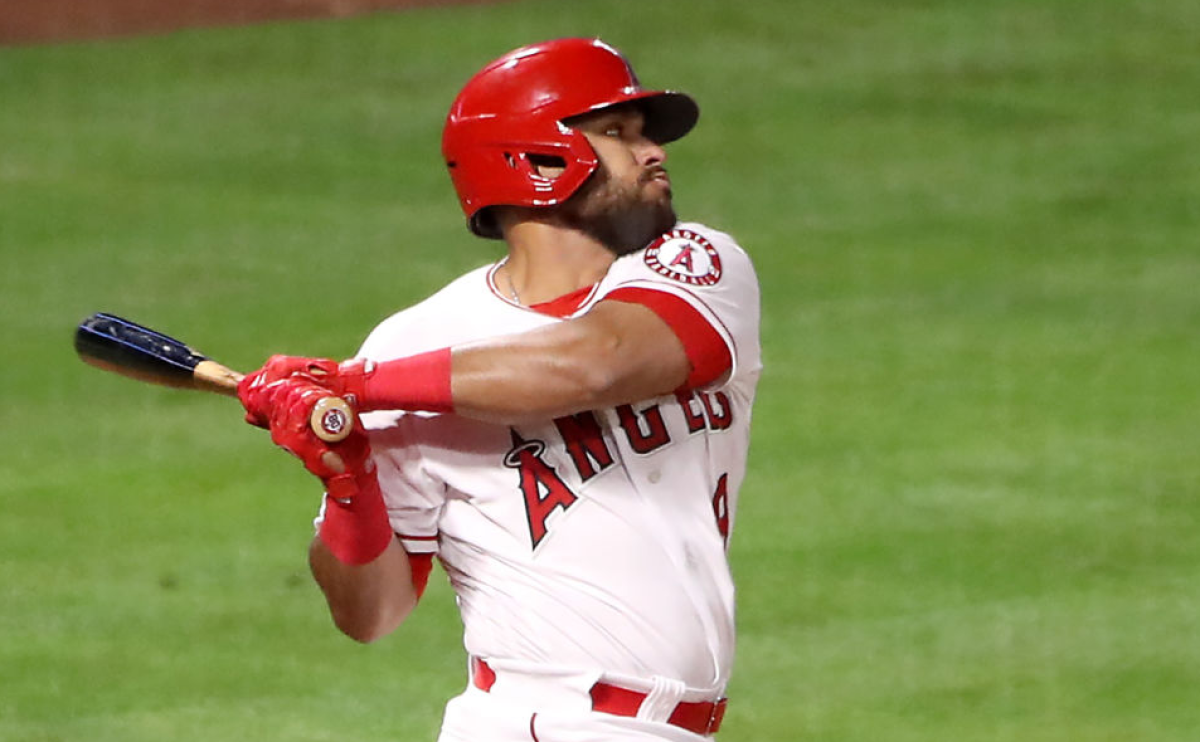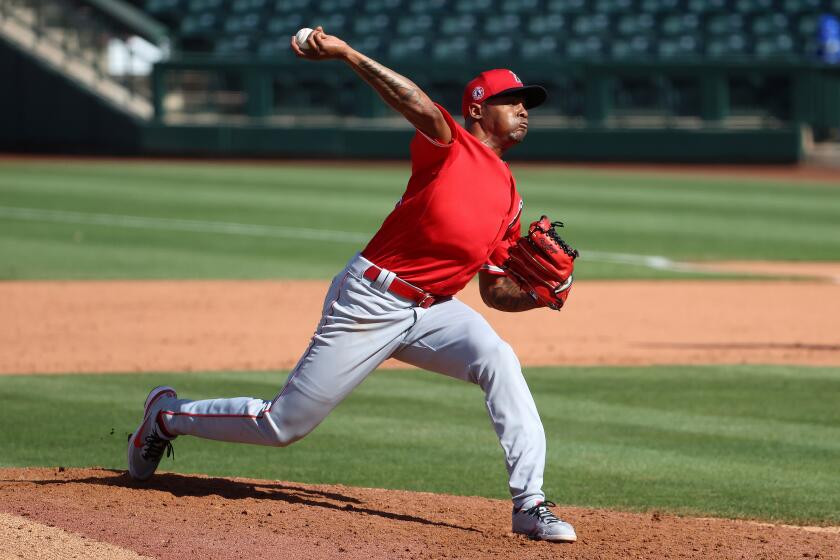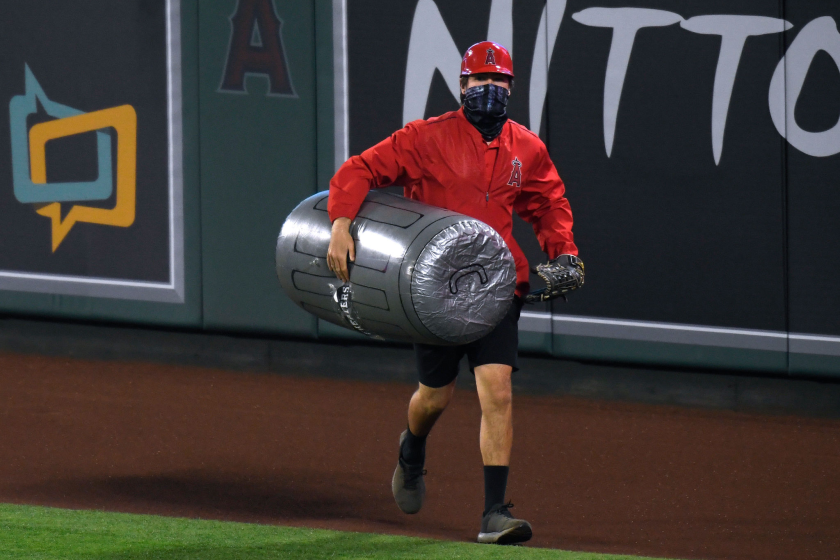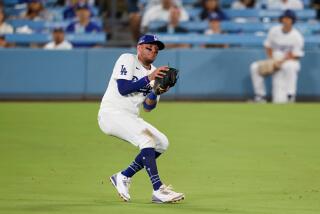Tale of José Rojas: How an Orange County kid kept the faith and made the Angels roster

Every time Rob Pegg sees a newspaper article about one of his favorite former players, the Vanguard University baseball coach clips it out and hangs it in his team’s dugout.
Lately, José Rojas has given him a lot of material.
It’s been five years since Rojas played his last game for Pegg’s team at Vanguard University, five years the Angels infielder has spent working for this moment — playing his first MLB season as a 28-year-old rookie.
But Pegg likes to use Rojas’ legacy as an example to his current players: about the value of hard work; the importance of sound fundamentals; how to navigate the long road toward the big leagues; and, perhaps most importantly, about how to keep believing in a dream.
“He’s such a humble guy, and hard-working,” Pegg said. “He’s just the model of what people should be.”
Even before Rojas made his MLB debut last Friday, or his first big league start Tuesday, many Angels fans were already enamored with his story: an Anaheim native now playing for his favorite childhood team, a player who overcame the odds as a 36th-round draft pick who spent a half-decade in the minors.
Angels manager should have a frank conversation with relief pitcher Raisel Iglesias if he’s the right man for saving situations.
He’s been asked a lot over the years if he ever doubted whether this opportunity would come, if he ever thought his dream might not be realized. Pressed on it again recently, Rojas needed only a few seconds to reply.
“I always fall back on my faith with that question,” he said. “My answer is simple: My faith in Christ, and having that belief deep down that I can do it, no matter what’s in front of me. The odds might be against me, but I believe that when you have faith, anything can happen. And here we are.”
‘I love it. Why not pursue it?’
The Wiffle Ball rules of Rojas’ childhood were simple.
Almost every day after school, he and his younger brother, Fernando, would go out to their front yard with only a bat and a ball. One of them would hit. The other would pitch. There was only one way to switch: Strike the batter out.
Recalling those days recently, Fernando began to laugh.
“I spent most of the time pitching,” he said. “Because I couldn’t get him out.”
For as long as Rojas can remember, a career in baseball has been his goal. And ever since he began playing, the Angels have been his favorite team.
“We would have an ‘Angels Day’ where our entire Little League would come out to [Angel Stadium] and walk around the warning track,” Rojas recalled. “Seeing that this was the highest level and it was an actual career, I figured, ‘I love it. Why not pursue it?’ ”
It’s exactly what Rojas’ mother, Maria, and father, also named Jose, hoped would happen when they immigrated to Southern California from Mexico more than 30 years ago to start a family. They never wanted any limitations on their four childrens’ dreams.
It wasn’t an easy process. Jose often balanced multiple jobs in landscaping and at restaurants. Maria worked a busy schedule as a nurse at a Los Alamitos hospital. But they were always heavily involved in their kids’ lives too, which in Rojas’ case meant countless baseball games, team meetings and practices over the years.
“He wasn’t a prima donna type guy that thought he was better than other guys. He earned it. Part of that is his upbringing, coming from a blue collar family.”
— Vanguard coach Rob Pegg
“They’re pillars, as I like to call it, in my journey,” Rojas said. “Without them, obviously, who knows if I would be here today.”
The family didn’t have money for private lessons, so Rojas improved his skills in other ways. He studied videos of MLB stars such as Chipper Jones, Mo Vaughn and Garret Anderson, making notes of how to mimic their mechanics. When he made the Anaheim High varsity team, he analyzed the basic scouting reports on each opponent’s pitchers.
“When you have a high school kid that does that,” said his former coach, Dave Torres, “you think it’s something special.”
After high school, Rojas played at Fullerton College, then transferred for his final two years to Vanguard, a NAIA school in Costa Mesa. He became so feared within the team’s conference, as Pegg recalled, that once he was intentionally walked in a playoff game . . . with the bases loaded.
“He wasn’t a prima donna type guy that thought he was better than other guys. He earned it,” Pegg said. “Part of that is his upbringing, coming from a blue-collar family.”
Within that family, Rojas was a role model as well, especially to Fernando, who began high school as Rojas was starting college.

“I would see him on varsity in high school, and that’s what I wanted to do,” Fernando said. “He was that fire in me.”
Neither of them knew it yet, but the reverse would soon become true, too.
‘My first eye-opener’
Fernando didn’t really understand what cancer was until the day his chest got tight.
It happened during a practice at the start of his freshman year of high school in the fall of 2011. He felt unusually tired. He could tell something was wrong.
Doctors discovered Fernando had lymphoma, the disease having spread to his chest, lungs and abdomen. Only 14 years old, he began rounds of chemotherapy that forced him to stay in the hospital for most of the next year.
“There were times I felt done, it was just so difficult on the body and taking a toll on me,” Fernando said. “I was tired of the pain. Just horrible days.”
Rojas was redshirting as a college freshman throughout the ordeal, baseball taking a backseat for one of the first times in his life. He frequently visited the hospital, and talked almost every day with Fernando on the phone. He wore a brave face, but privately struggled to make sense of the turmoil around him.
“It was my first eye-opener,” he said. “I didn’t know how to cope with it.”
“We all go through hardships in life. It all comes down to how you overcome those things.”
— José Rojas
Fernando was eventually cured, going on to his own accomplished high school and junior college baseball career. Through the Make-A-Wish Foundation, he even got to meet with Albert Pujols and other Angels players before a 2012 home game — years before they would become Rojas’ future teammates.
But it was the moments when Fernando’s prognosis wasn’t clear, when it was uncertain whether or not his treatments would work, that made the biggest impact on his older brother.
“That’s when I really started seeking my faith, practicing my faith, praying, seeking a spiritual lifestyle,” Rojas said. “It’s a miracle that he was cured from cancer. Given the stakes of his diagnosis, it wasn’t for sure that he was going to be cured. For me, that was like a prayer answered.”
His renewed faith, he said, taught him an important lesson: “We all go through hardships in life. It all comes down to how you overcome those things.”
Torres, who coached Fernando at Anaheim High as well, grew close to the family during the ordeal. He remembers sensing a change in Rojas afterward. A focused conviction that hadn’t been there before. A quiet maturation thrust upon him almost overnight.
“I think it was a time he realized that, ‘I can help my family out by doing something,’ ” Torres said. “And I think he chose baseball to try to do that.”
‘I feel ready for it’
Before long, his baseball career faced its own tests.
The day he was drafted was a joyous event — Rojas, Fernando, and their father celebrating in their living room when his name popped up as the 1,086th overall pick in 2016.
But once he got to the pros, the infielder faced an uphill climb for playing time. He always swung the bat well, becoming a career .292 minor-league hitter, but struggled to prove himself defensively while serving largely in a designated hitting role behind other priority prospects.
He hit 31 home runs in Triple-A in 2019 and impressed at the Angels’ alternate training site in Long Beach last summer. But he wasn’t called up to majors in either season, and went unselected by the rest of MLB in back-to-back Rule 5 drafts the past two winters.
“It was a slap to the face, a hit to the rib cage,” Fernando said. “But he stayed on track, stayed on the road, grinded it out.”
This is where Rojas credits his self-belief, the ability to forge on when others might have faded.
Playing in front of SoCal fans for the first time since their sign-stealing scandal became public in November 2019, the Astros were heckled in Anaheim.
“It’s a business, beyond our control,” Rojas said. “You get stressed out thinking otherwise.”
So, even though he entered camp this spring looking like a long shot for the roster, he kept refining his swing, kept working on his defense, kept trying to prove to the team’s new front office that he truly belonged.
Then, suddenly, a door opened. Franklin Barreto got hurt. Luis Rengifo was optioned. And Rojas, who had stayed hot throughout the Cactus League and shown improvements at second and third base, was the last man standing for the team’s utility infield spot. Less than a week before opening day, manager Joe Maddon made it official.
“He told me it was about time to give me a shot,” Rojas said with a grin. “I feel ready for it.”
When Rojas made his debut Friday as a ninth-inning pinch-hitter, it didn’t matter that the game was out of reach, or really even that he struck out against Chicago White Sox closer Liam Hendriks.
He had his family in the stadium, crying from the stands. He had old coaches watching on TV, smiling from afar. And he finally had the moment he’d been chasing since forever, saying a prayer as he reflected on a path that taught him to never give up.
More to Read
Go beyond the scoreboard
Get the latest on L.A.'s teams in the daily Sports Report newsletter.
You may occasionally receive promotional content from the Los Angeles Times.










